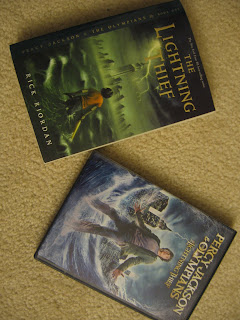
The other week I took a road trip from Raleigh to D.C. with a bunch of teens and middle schoolers. I'll share more about the trip over the next few weeks here on Writermorphosis. It was a long-planned-for trip, and one of the reasons why this blog has been idle for a month or more. I apologize! But I'm back now, and I've learned some wisdom for writers from my teen and pre-teen friends.
The first thing I learned was from my 12 year old friend David who sat behind my driver's seat reading the 5th book in the Percy Jackson series, while his 11 year old friend Sam sat beside him immersed in Eldest, the second book in the Eragon Trilogy. They passed the time reading as the tree-lined miles of I-95 rolled by outside our car. Impressed by how interested in the stories they were, I asked David if he'd seen the recent Percy Jackson and the Olympians movie, and whether he thought it was better or worse than the book. He marked his page with his finger and glanced up thoughtfully, meeting my eyes in the rear-view mirror. "Um...the movie wasn't bad," he said. "I don't think either one was better or worse than the other. The book is really good. But the movie was good too. They were just really different from each other, but they were both good."
And there you have it, folks. David has noticed something I've noticed too. There are many brilliantly-written books, and many brilliantly written movie scripts that tell the same story in a slightly different way. One is not necessarily more well-plotted or put together than the other. They're just different; different ways of telling the same story.
Movies about books we love can teach us writers many things. But most importantly they teach us about revision.
You see, your book -- the one you love and have slaved over -- and you're world and characters that you have created...they may not have to be just exactly the way that they are right now for your story to be a success.
WHAT?
Yes, it's true. We get attached to our creations. So, when an editor, agent, or writing colleague says "hey, you know, I'm just not sure that such and such particular aspect of your story is working as well as it could be..." we get frustrated. We want to stand our ground and say "you don't understand. If she doesn't wear the gingham shorts to camp, then when the boys later steal her shorts and fly them from the flagpole, it won't make any sense that I've titled the book `Gingham! It's integral to the plot!"
But really, ladies and gents, sometimes changing your character's ethnicity, or hair color, or hobbies, or choices can strengthen your story. Sometimes `gingham' maybe shouldn't even be the name of your book. Change isn't always bad. And our first instinct isn't always right. The beauty of fiction -- whether in screenwriting or novel writing, is that we authors control it, we build it -- and we can change it. Because changing our stories is painful, but it's also powerful. One story can be tweaked to go in various directions, like a chameleon that remains always the same animal, but that fits beautifully into different places depending on the color it chooses to be at that time. So don't be afraid to re-write that chapter or character or scene several different ways to see which one you like the best. Don't be afraid to change your chameleon.
As 12 year old David might say, none of your plot twists, character sketches, or theme ideas are necessarily better or worse than the others. It could be that "they're all good. They're just different."
Let's not be afraid to look at all of our options. Even it that means turning our stories a bit sideways.










